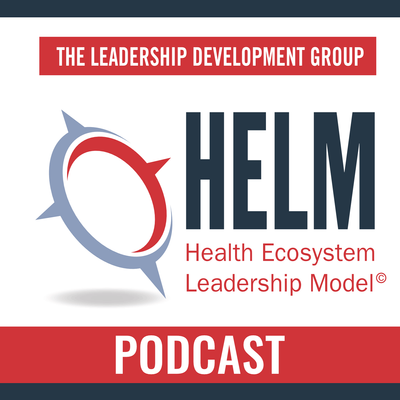
Health Ecosystem Leadership Model (HELM™) Podcast Series
engelsk
Business
Begrænset tilbud
2 måneder kun 19 kr.
Derefter 99 kr. / månedOpsig når som helst.
- 20 lydbogstimer pr. måned
- Podcasts kun på Podimo
- Gratis podcasts
Læs mere Health Ecosystem Leadership Model (HELM™) Podcast Series
The purpose of this podcast series is to showcase how leadership is the essential ingredient to address the ever-growing issues and challenges facing the US healthcare industry. As we know, the great majority of these challenges are too complex and wide ranging for any one sector to solve independently. This is where a health ecosystem leadership approach pays more than significant dividends. Solutions which emphasize how the various sectors of the health industry – such as hospitals and health systems, pharmaceutical companies, payers, policymakers, local government, community organizations – operate interdependently are the only ones with the potential to deliver on critical imperatives, like affordability, access, and outcomes. During this podcast, we will introduce you to some of the best and brightest health ecosystem leaders, who will share practical examples of how they have successfully demonstrated a collaborative mindset and the critical behaviors that lead to positive outcomes for their organizations, their patients, and the communities they serve. The behaviors and competencies these leaders demonstrate form the basis of our Health Ecosystem Leadership Model (HELM™), a framework for how leaders generate cross-sector solutions to the healthcare industry’s most pressing needs by envisioning a new future, aligning diverse stakeholders, managing boundaries and obstacles, and continuously acting and learning.
Alle episoder
11 episoder11 – Interview with Rick Pollack, MPA, President and CEO of the American Hospital Association
Rick Pollack is President and CEO of the American Hospital Association, elected in May 2015, having served the organization for more than three decades. The AHA represents more than 5,000 hospitals and 43,000 members nationwide—and works to ensure that the perspective and needs of healthcare providers are heard and addressed in national health policy development. The association has been cited by numerous national publications as one of the most influential and effective advocacy organizations in Washington. Rick has developed a sterling reputation for pressing the hospital group’s agenda on Capitol Hill and beyond. Under his leadership, the AHA launched AHAPAC, now one of the largest health care political action committees in the U.S., supporting congressional candidates who support hospitals and patients. Through his vision, the AHA also helped found in 2000 the Coalition to Protect America’s Health Care, a group of providers, businesses and other stakeholders dedicated to ensuring the financial viability of our nation’s hospitals from the threats of federal cuts in reimbursement for hospital payments. Rick has been a leader in efforts to expand health coverage in the U.S., taking part in many broad-based national coalitions that ultimately led to coverage expansion under the Affordable Care Act. Show Notes There are a number of public policy issues on the horizon that will impact the health ecosystem in the coming year. These include Medicaid payments to hospitals and health systems, eliminating surprise billing, addressing the skyrocketing costs of prescription drugs, ongoing work to ease the regulatory burden in areas that don’t impact patient care, ongoing litigation with the federal government regarding regulations, and of course, the 2020 election. Providers, insurers and pharmaceutical companies can be competitors or collaborators depending on the issue at hand. We’re all working to innovate and improve patient care. The field is moving towards value-based payment. We are seeing an increase in delivery system reforms that will transform the industry to focus on quality and cost. Hospital mergers are good for patients because they provide the scale to manage risk, access capital, and purchase equipment and supplies more efficiently. Hospitals and health systems are working to expand their reach outside the four walls to provide care to patients throughout the community and even in their homes. This includes working to address the social determinants of health, which have an outsized role in the health of individuals.
10- Interview with Dr. David Shulkin, Ninth Secretary, U.S. Department of Veteran Affairs
Dr. David Shulkin was Ninth United States Secretary of Veterans Affairs from 2017 to 2018 under President Trump and is the author of the new book “It Shouldn’t be This Hard to Serve Your Country” which was released October 22nd, 2019. He was the Under Secretary of Veterans Affairs for Health from 2015 until 2017, appointed by President Obama. He has been described as one of the “high priests” of patient-centered care. Prior to his government service, Dr. Shulkin was the President and Chief Executive Officer of Beth Israel Medical Center in New York City and President of Morristown Medical Center and Vice President of the Atlantic Health System Accountable Care Organization. Show Notes Healthcare leaders of the future should look to the skill sets that leaders in other high-performing industries use to drive sustained success, such as 1) strategic nimbleness, with the realization that healthcare as we know it needs to be reinvented; 2) collaborative intent, with a goal of achieving partnerships between doctors, hospitals, payors, patients and vendors that have aligned incentives and interests, all directed at delivering better care at a lower cost; 3) execution discipline, and moving beyond “success” being defined as incremental progress around the margins of your core business. Mission and margin can coexist as long as the outcomes benefit the consumer. High quality care can be more profitable than lower quality care. The best way we’ve done this is to look to partner and invest in organizations that generate a wellness ROI. Organizations can establish successful partnerships by identifying a common vision, agreeing upon goals, and building common ground. Partner organizations can overcome boundaries and obstacles by keeping a customer-focused view on their problems and by demonstrating “collective sacrifice” when needed. Leaders can accelerate transformative value by matching their risks with innovation; by testing innovative practices on services that need to be changed; those that effect total cost of care and quality outcomes the greatest.
09 – Interview with Dr. Craig Samitt, President & CEO of Blue Cross Blue Shield of MN and Stella
Dr. Samitt is the President & CEO of Blue Cross Blue Shield of MN and its parent company, Stella. He came to Blue Cross in July 2018 from Anthem, Inc., where he served as EVP and President of Anthem’s Diversified Business Group, and as Chief Clinical Officer. Dr. Samitt has led sequential health systems transformations, previously serving as President & CEO of HealthCare Partners and President & CEO of Dean Health System. Dr. Samitt received his undergraduate degree from Tufts University, his Doctorate in Medicine from Columbia University, and his Masters in Business Administration from The Wharton School. Dr. Samitt has been a nationally recognized expert and thought leader on health care delivery and policy. His record of collaborating across the health care system to deliver higher quality care at a lower cost led to him being named as one of the “50 Most Influential Physician Executives and Leaders” by Modern Healthcare in 2018. Show Notes Healthcare leaders of the future should look to the skill sets that leaders in other high-performing industries use to drive sustained success, such as 1) strategic nimbleness, with the realization that healthcare as we know it needs to be reinvented; 2) collaborative intent, with a goal of achieving partnerships between doctors, hospitals, payors, patients and vendors that have aligned incentives and interests, all directed at delivering better care at a lower cost; 3) execution discipline, and moving beyond “success” being defined as incremental progress around the margins of your core business. Mission and margin can coexist as long as the outcomes benefit the consumer. High quality care can be more profitable than lower quality care. The best way we’ve done this is to look to partner and invest in organizations that generate a wellness ROI. Organizations can establish successful partnerships by identifying a common vision, agreeing upon goals, and building common ground. Partner organizations can overcome boundaries and obstacles by keeping a customer-focused view on their problems and by demonstrating “collective sacrifice” when needed. Leaders can accelerate transformative value by matching their risks with innovation; by testing innovative practices on services that need to be changed; those that effect total cost of care and quality outcomes the greatest.
08 – Interview with Nancy Howell Agee, President and CEO of Virginia-based Carilion Clinic
Nancy Howell Agee is President and CEO of Virginia-based Carilion Clinic, an integrated health system which serves more than 1 million. Carilion Clinic includes seven hospitals which employs over 800 providers. Prior to becoming CEO in 2011, Ms. Agee service as EVP and COO. During her time as COO, she co-led Carilion’s reorganization from a collection of hospitals into a full integrated, physician-led clinic. The reorganization resulted in a partnership with Virginia Tech to create a medical school and research institute, which has quickly garnered over $100 million in external funding. Ms. Agee has been recognized as healthcare’s 100 most influential people for the past four years by Modern Healthcare and currently services as past chair for the American Hospital Association. She was recognized by Virginia Business as Virginia Business Person of the Year in 2017 and named among the 50 most influential people in Virginia five years running. Last year, she was honored to be named the recipient of the Gail L. Warden Leadership Excellence Award in 2018. Ms. Agee holds degrees with honors from the University of Virginia and Emory University and honorary degrees from Roanoke College and Jefferson College of Health Sciences. Show Notes: Leaders can find the management philosophy known as servant leadership effective at improving relationships and decision-making by giving employees a greater voice. Efficiency can be maintained in matrix structured organizations by forming networks of leaders that can easily share information and by upholding transparent communication with employees. By giving the local community a say in the internal processes of an organization, medical institutions can keep a consistent pulse on the community needs, maintain a close relationship with the populations they serve, and gain local support. Conflict between partner organizations can be overcome by reframing and agreeing on a common language and by approaching cultural issues together, with an open mind and creativity.
07 – Interview with Laura Landy, President and CEO of the Rippel Foundation
Laura Landy is President and CEO of the Rippel Foundation and has guided the creation of ReThink Health and FORESIGHT: Designing the Future for Health, the Foundation’s two flagship initiatives. Rippel seeds innovations in health by working with national and regional leaders to better see and execute systemic approaches that can transform our current system – one designed for another time, and create opportunities for better health and well-being for all. ReThink Health works with well-positioned stewards beginning where they are today; FORESIGHT looks ahead at future trends and emerging ideas and how they can accelerate transformative efforts. Laura has nearly four decades of experience addressing changing dynamics in health, higher education, economic development, social services, and culture. Her professional career includes relationships with The Ford Foundation, Pfizer, New Jersey’s public health system, AT&T’s Bell Labs, the 92nd Street Y, Adelphi University, and others. Laura has served in leadership roles in many academic institutions including creating the Institute for Nonprofit Entrepreneurship at NYU’s Stern School of Business, helping lead both NYU’s and Fairleigh Dickinson’s entrepreneurial centers, and serving as adjunct faculty at Columbia University and the New School. She currently serves on the Dartmouth-Hitchcock Health Board of Trustees and is a board member of Grantmakers in Health. Laura received her undergraduate degree from Washington University in St. Louis. She received her MBA from New York University, and is a Fellow of the New York Academy of Medicine. Show Notes: Collaboration among disconnected healthcare entities can be achieved by determining the unique interests of all stakeholders involved and leveraging common co-dependencies among them. To support collaborative solutions, four key areas require focused attention: (1) creating a sound strategy, (2) clarifying values among stakeholders, (3) broadening stewardship across silos, and (4) creating sources of sustainable financing. Engaging with the ecosystem involves continued learning, comfort with change, and thinking about what’s possible. Collaboration is an indispensable technique to solve the tough problems facing population health today such as the menta
Vælg dit abonnement
Begrænset tilbud
Premium
20 timers lydbøger
Podcasts kun på Podimo
Gratis podcasts
Opsig når som helst
2 måneder kun 19 kr.
Derefter 99 kr. / måned
Premium Plus
100 timers lydbøger
Podcasts kun på Podimo
Gratis podcasts
Opsig når som helst
Prøv gratis i 7 dage
Derefter 129 kr. / month
2 måneder kun 19 kr. Derefter 99 kr. / måned. Opsig når som helst.

































